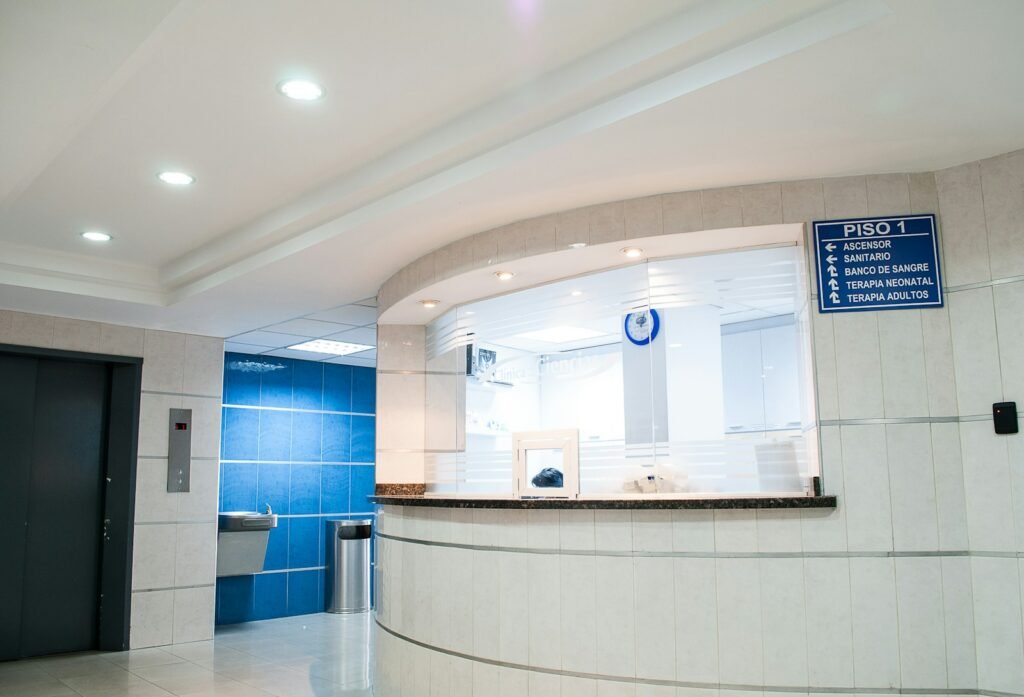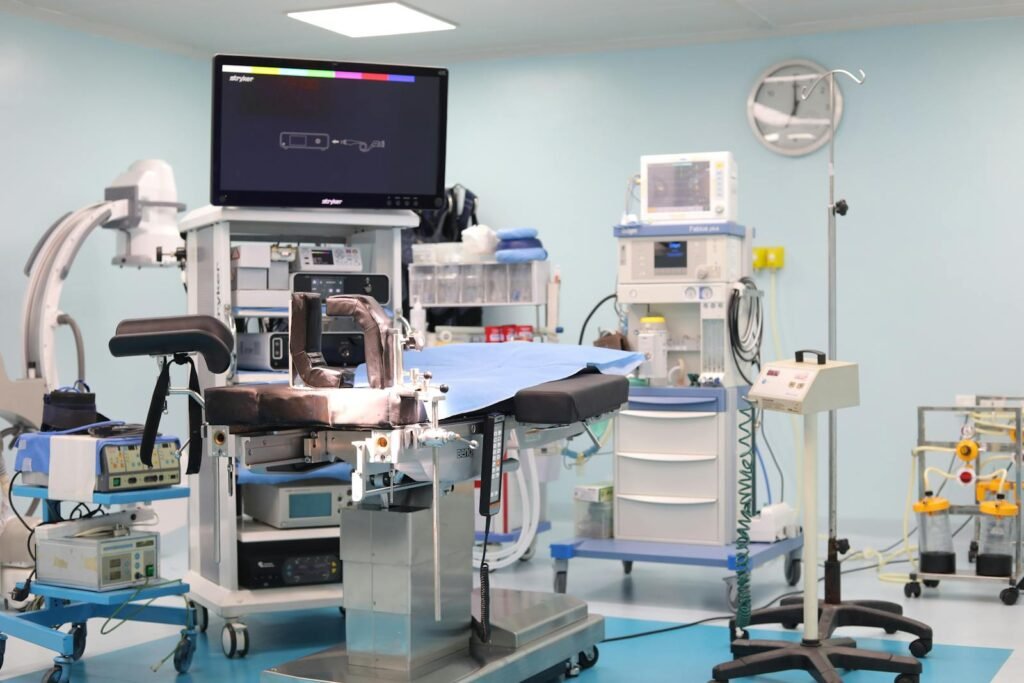Industry-Tailored Solutions for Healthcare Challenges
Enhancing Cybersecurity for Healthcare
Challenge # 1
Limited Resources
As a small-sized firm, the client had limited financial and human resources dedicated to cybersecurity.
Challenge # 2
Compliance Requirements
The firm needed to adhere to regulatory standards such as HIPAA (Health Insurance Portability and Accountability Act) to ensure the confidentiality, integrity, and availability of patient information.
Challenge # 3
Cyber Threat Landscape
The healthcare sector is a prime target for cyberattacks due to the value of patient data. The client faced risks such as ransomware attacks, data breaches, and phishing attempts.
Solution Landscape
Solution Provided
The client engaged Rogue Logics to assess their current security posture
and implement tailored measures to address vulnerabilities and enhance protection. The following steps were undertaken:
Comprehensive Security Assessment
Rogue Logics conducted a thorough assessment of the client’s IT infrastructure, including networks, systems, and applications. This assessment identified weaknesses, gaps, and compliance issues.
Risk Mitigation Strategy
Based on the assessment findings, a customized risk mitigation strategy was developed, outlining specific actions to address identified vulnerabilities. This strategy focused on implementing robust security controls, enhancing network defenses, and improving employee awareness through training
programs.
Technology Implementation
Rogue Logics deployed advanced cybersecurity technologies tailored to the client’s needs and budget. This included next-generation firewalls, endpoint protection systems, intrusion detection/prevention systems, and encryption solutions to safeguard data both at rest and in transit.
Employee Training and Awareness
Recognizing the crucial role of employees in cybersecurity, Rogue Logics provided tailored training sessions to educate staff about
cyber threats, phishing awareness, and best practices for data protection. Regular security awareness campaigns were conducted to reinforce good cybersecurity habits.
Continuous Monitoring and Incident Response
Rogue Logics implemented a 24/7
monitoring system to detect and respond to security incidents in real-time. This proactive approach helped in identifying and mitigating potential threats before they
could cause significant harm.
Results Achieved
Improved Security Posture
The implemented cybersecurity measures significantly enhanced the client’s security posture, reducing the risk of data breaches, unauthorized
access, and other cyber threats.

Results Achieved
Regulatory Compliance
The implemented cybersecurity measures significantly enhanced the client’s security posture, reducing the risk of data breaches, unauthorized access, and other cyber threats.

Results Achieved
Enhanced Data Protection
Patient data was effectively safeguarded against unauthorized access, ensuring confidentiality and integrity. Encryption and access controls were implemented to protect sensitive information from internal and external threats.

Results Achieved
Reduced Cyber Risk
The client experienced a noticeable decrease in cyber incidents
and security breaches following the implementation of cybersecurity solutions. This helped in preserving the firm’s reputation and trust among patients and stakeholders.

Conclusion
Partnering with Rogue Logics,
By partnering with Rogue Logics, the healthcare firm successfully strengthened its cybersecurity posture, mitigated risks, and ensured compliance with regulatory requirements. The proactive approach to cybersecurity, combined with ongoing monitoring and employee awareness, has helped in safeguarding patient data and maintaining the firm’s reputation as a trusted healthcare provider in the community.
Cloud Transformation for Healthcare Firm
Challenge # 1
Scalability and Flexibility
As a small-sized firm, the client had limited financial and human resources dedicated to cybersecurity.
Challenge # 2
Data Management
The firm needed to adhere to regulatory standards such as HIPAA (Health Insurance Portability and Accountability Act) to ensure the confidentiality, integrity, and availability of patient information.
Challenge # 3
Legacy Systems
The healthcare sector is a prime target for cyberattacks due to the value of patient data. The client faced risks such as ransomware attacks, data breaches, and phishing attempts.
Challenge # 4
Disaster Recovery and Business Continuity
The healthcare sector is a prime target for cyberattacks due to the value of patient data. The client faced risks such as ransomware attacks, data breaches, and phishing attempts.
Solution Landscape
Solution Provided
The healthcare firm partnered Rogue Logics to embark on a comprehensive journey towards modernizing its IT infrastructure and operations. The following steps were undertaken:
Assessment and Planning
Rogue Logics conducted a detailed assessment of the client’s existing IT landscape, business objectives, and regulatory requirements. Based on the assessment findings, a tailored cloud migration strategy and roadmap were developed to guide the transformation process.
Cloud Migration
Rogue Logics facilitated the migration of the client’s workloads, applications, and data to the cloud platform, leveraging a combination of lift-and-shift, re-platforming, and re-architecting approaches. This ensured a seamless transition to the cloud while minimizing disruptions to ongoing operations.
Infrastructure Modernization
Legacy systems and applications were modernized or replaced with cloud-native solutions to leverage the scalability, flexibility, and cost- efficiency of cloud computing. This included the adoption of Software as a Service (SaaS), Platform as a Service (PaaS), and Infrastructure as a Service (IaaS) offerings.
Data Management and Security
Robust data management practices were implemented to ensure the secure storage, transmission, and access of patient data in compliance with HIPAA and other regulatory requirements. Data encryption, access controls, and backup solutions were deployed to safeguard sensitive information and enhance resilience against cyber threats.
Disaster Recovery and Business Continuity
The cloud transformation included the establishment of a robust disaster recovery and business continuity framework leveraging cloud-based replication, failover, and backup solutions. This ensured the organization’s ability to recover quickly from disruptions and maintain uninterrupted service delivery.
Results Achieved
Scalability and Agility
The healthcare firm gained the scalability and agility needed to adapt to changing patient demands and market dynamics. Cloud technology enabled rapid provisioning of resources and accelerated time-to-market for new services and applications.

Results Achieved
Cost Optimization
By migrating to the cloud, the client achieved cost savings through reduced capital expenditure on hardware and infrastructure maintenance. Pay-per-use pricing models and resource optimization further contributed to cost efficiency.

Results Achieved
Improved Patient Care
The modernized IT infrastructure facilitated seamless collaboration among healthcare providers, improved access to patient data, and enabled telehealth and remote monitoring services, enhancing the quality and accessibility of patient care.

Results Achieved
Enhanced Security and Compliance
The cloud transformation strengthened the security posture of the healthcare firm, ensuring compliance with regulatory standards such as HIPAA. Data encryption, access controls, and automated compliance management tools helped mitigate security risks and safeguard patient confidentiality.

Results Achieved
Business Continuity
The implementation of cloud-based disaster recovery and business continuity solutions ensured resilience against potential disruptions, enabling the organization to maintain critical healthcare services even in the face of emergencies or natural disasters.

Conclusion
Partnering with Rogue Logics,
By partnering with Rogue Logics, the healthcare firm successfully modernized its IT infrastructure, leveraging cloud technology to enhance scalability, agility, security, and compliance. The cloud transformation enabled the organization to deliver high-quality patient care, optimize costs, and ensure business continuity in a rapidly evolving healthcare landscape.
AI and Machine Learning Transformation for Healthcare Firm
Challenge # 1
Data Management and Analysis
Managing and analyzing large volumes of patient data from diverse sources in a timely and efficient manner was a significant challenge for the healthcare firm.
Challenge # 2
Clinical Decision Support
Clinicians needed advanced tools and insights to support clinical decision-making, diagnosis, treatment planning, and personalized patient care.
Challenge # 3
Predictive Analytics
The organization aimed to leverage predictive analytics to anticipate disease outbreaks, identify high-risk patients, and optimize resource allocation for better population health management.
Challenge # 4
Medical Imaging Analysis
Manual interpretation of medical images, such as X-rays, MRIs, and CT scans, was time-consuming and prone to human error, leading to delays in diagnosis and treatment.
Solution Landscape
Solution Provided
The healthcare firm partnered with Rogue Logics to embark on a transformative journey towards harnessing the potential of AI-driven healthcare innovation. The following solutions were implemented:
Data Integration and Analysis
Rogue Logics developed custom AI-powered platforms to aggregate, harmonize, and analyze disparate healthcare data, including electronic health records (EHRs), medical imaging data, genomics data, and real-time sensor data from medical devices. Advanced analytics techniques such as natural language processing (NLP) and deep learning were employed to derive actionable insights from the data.
Clinical Decision Support Systems
AI-driven clinical decision support systems were deployed to assist healthcare providers in diagnosing diseases, identifying treatment options, predicting patient outcomes, and personalizing care plans. These systems leveraged ML algorithms trained on vast datasets of medical literature, patient records, and treatment outcomes to provide evidence-based recommendations at the point of care.
Predictive Analytics and Population Health Management
The organization implemented predictive analytics models to forecast disease trends, identify at-risk patient populations, and optimize preventive interventions. AI algorithms analyzed historical patient data to predict future health outcomes, enabling proactive interventions and resource allocation for better population health management.
Medical Imaging Analysis
AI-powered medical imaging analysis solutions were deployed to automate the interpretation of medical images and assist radiologists and clinicians in detecting abnormalities, diagnosing diseases, and planning treatments.
Convolutional neural networks (CNNs) and deep learning algorithms were trained on
annotated image datasets to achieve high accuracy and reliability in image analysis.
Results Achieved
Improved Clinical Outcomes
The implementation of AI-driven clinical decision support systems improved the accuracy and efficiency of clinical diagnosis, treatment planning, and patient monitoring, leading to better clinical outcomes and reduced medical errors.

Results Achieved
Enhanced Operational Efficiency
AI and ML solutions optimized operational processes such as patient triage, resource allocation, appointment scheduling, and inventorymanagement, leading to cost savings, reduced waiting times, and improved patient satisfaction.

Results Achieved
Proactive Healthcare Management
Predictive analytics models enabled proactive healthcare management by identifying high-risk patients, predicting disease progression, and recommending preventive interventions, ultimately reducing hospital readmissions and healthcare costs.

Results Achieved
Faster and Accurate Diagnostics
AI-powered medical imaging analysis solutions facilitated faster and more accurate diagnostics by automating the interpretation of medical images, enabling early detection of diseases and timely treatment interventions.

Results Achieved
Continuous Learning and Improvement
The AI and ML algorithms deployed by RogueLogics were continuously trained and refined using real-world data, enabling ongoing learning and improvement in performance over time.

Conclusion
Partnering with Rogue Logics,
By partnering with Rogue Logics, the healthcare firm successfully transformed its operations, leveraging advanced technologies to improve patient outcomes, optimize operational efficiency, and drive innovation in healthcare delivery. The adoption of AI-driven solutions empowered healthcare providers with actionable insights, personalized care recommendations, and predictive analytics capabilities, paving the way for a data-driven and patient-centric approach to healthcare transformation.
Data Science and Analytics Transformation for Healthcare Firm
Challenge # 1
Data Silos
The client’s data was fragmented across multiple systems and departments, leading to data silos and hindering collaboration and analysis.
Challenge # 2
Predictive Analytics
There was a need to leverage predictive analytics to forecast patient volumes, predict disease outbreaks, and identify opportunities for intervention and prevention.
Challenge # 3
Operational Efficiency
The organization sought to optimize operational processes such as patient scheduling, resource allocation, and inventory management to improve efficiency and reduce costs.
Challenge # 4
Clinical Decision Support
Healthcare providers required tools and insights to support clinical decision-making, diagnosis, and treatment planning, based on comprehensive analysis of patient data.
Solution Landscape
Solution Provided
The healthcare firm partnered with Rogue Logics to implement a transformative data-driven strategy. The following solutions were deployed:
Data Integration and Cleansing
Rogue Logics implemented data integration and cleansing processes to aggregate, clean, and harmonize disparate data sources, including electronic health records (EHRs), financial data, operational data, and patient satisfaction surveys. This facilitated a single source of truth for comprehensive analysis.
Predictive Analytics Models
Advanced predictive analytics models were developed to forecast patient volumes, predict disease trends, and identify high-risk patient populations. Machine learning algorithms analyzed historical data to generate actionable insights for proactive intervention and preventive care.
Operational Analytics
The organization leveraged data analytics to optimize operational processes such as patient flow management, staff scheduling, inventory management, and facility utilization. Real-time dashboards and analytics tools provided
visibility into key performance metrics and enabled data-driven decision-making.
Clinical Decision Support Systems
Data-driven clinical decision support systems were deployed to assist healthcare providers in diagnosis, treatment planning, and patient management. These systems leveraged machine learning algorithms to analyze patient data and medical literature, providing evidence-based recommendations and alerts at the point of care.
Patient Engagement and Personalization
Data analytics solutions were utilized to analyze patient demographics, preferences, and behaviors, enabling personalized communication, targeted interventions, and improved patient engagement.
Results Achieved
Improved Patient Outcomes
The implementation of data-driven clinical decision support systems improved the accuracy and efficiency of diagnosis, treatment planning, and patient management, leading to better clinical outcomes and reduced medical errors.

Results Achieved
Enhanced Operational Efficiency
Data analytics solutions optimized operational processes such as patient scheduling, resource allocation, and inventory management, leading to cost savings, reduced wait times, and improved patient satisfaction.

Results Achieved
Proactive Healthcare Management
Predictive analytics models enabled proactive healthcare management by identifying high-risk patient populations, predicting disease progression, and recommending preventive interventions, ultimately reducing hospital readmissions and healthcare costs.

Results Achieved
Data-Driven Decision Making
The organization adopted a data-driven culture, empowering stakeholders with actionable insights and real-time analytics tools to support decision-making across all levels of the organization.

Results Achieved
Continuous Improvement
The data science and analytics solutions deployed by RogueLogics were continuously monitored, refined, and optimized based on feedback and evolving business needs, ensuring ongoing improvement and innovation.

Conclusion
Partnering with Rogue Logics,
By partnering with Rogue Logics, the healthcare firm successfully transformed its operations, leveraging data-driven insights to improve patient care, optimize operations, and drive innovation. The adoption of advanced analytics tools and predictive models empowered healthcare providers with actionable insights, personalized care recommendations, and proactive intervention capabilities, paving the way for a data-driven and patient-centric approach to healthcare transformation.
